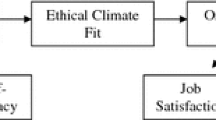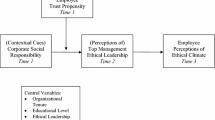Abstract
This paper examines the relationship between organizational ethical culture in two large international CPA firms, auditors' personal values and the ethical orientation that those values dictate, and judgments in ethical dilemmas typical of those that accountants face. Using an experimental task consisting of multiple judgments designed to vary in "moral intensity" (Jones, 1991), and unique as well as tried-and-true approaches to variable measurements, this study examined the judgments of more than three hundred participants in our study. ANCOVA and path analysis results indicate that: (1) Ethical judgments in situations of high moral intensity are affected by personal values and by environmental variables, such as the professional code of conduct (direct and indirect effects) and previous ethics instruction (direct effect only). (2) Corporate ethical culture, and a relatively strong firm rules-orientation, affect auditors' idealism but not relativism, and therefore indirectly affect ethical judgments. Jones' (1991) moral intensity argument is supported: differences in the characteristics of specific judgment tasks apparently result in different decision processes.
Similar content being viewed by others
References
Armstrong, M. B.: 1984, Internalization of the Professional Ethic by Certified Public Accountants: A Multidimensional Scaling Approach. Unpublished doctoral dissertation, University of Southern California.
Armstrong, M. B.: 1987, ‘Moral Development and Accounting Education’, Journal of Accounting Education 5(Spring), 27–43.
Armstrong, M. B.: 1993, ‘Ethics and Professionalism in Accounting Education: A Sample Course’, Journal of Accounting Education 11(Spring), 77–92.
Arrington, C. E. and P. M. J. Reckers: 1985, ‘A Social-psychological Investigation into Perceptions of Tax Evasion’, Accounting and Business Research 15(Summer), 163–176.
Bearden, W. O., R. G. Netemeyer and M. F. Mobley: 1993, Handbook of Marketing Scales: Multi-Item Measures for Marketing and Consumer Behavior Research (Sage Publications, Newbury Park, CA).
Blalock, D.: 1996, ‘For Many Executives, Ethics Appear To Be a Write Off’, The Wall Street Journal (March 26), C1, C3.
Brief, A. P., J. M. Dukerich and L. I. Doran: 1991, ‘Resolving Ethical Dilemmas in Management: Experimental Investigations of Values, Accountability, and Choice’, Journal of Applied Social Psychology 21 (March 1–15), 380–396.
Brief, A. P., J. M. Dukerich, P. R. Brown and J. F. Brett: 1996, ‘What's Wrong with the Treadway Commission Report? Experimental Analyses of the Effects of Personal Values and Codes of Conduct on Fraudulent Financial Reporting’, Journal of Business Ethics 15 (February), 183–198.
Casler, D. J.: 1964, The Evolution of CPA Ethics: A Profile of Professionalization. Occasional Paper No. 12, Bureau of Business and Economic Research, Graduate School of Business Administration, Michigan State University, East Lansing, MI.
Cavanagh, G. and D. Fritzsche: 1985, ‘Using Vignettes in Business Ethics Research’, Research in Corporate Social Performance and Policy 7, 279–293.
Cohen, J., L. Pant and D. Sharp: 1994, ‘An International Comparison of Moral Constructs Underlying Auditors' Ethical Judgments’, Proceedings of the Ernst & Young Research on Accounting Ethics Symposium (June 12–14), 34–45.
Dillard, J. F. and K. R. Ferris: 1989, ‘Individual Behavior in Professional Accounting Firms: A Review and Synthesis’, Journal of Accounting Literature 8, 208–234.
Douglas, P. C. and B. N. Schwartz: 1999, ‘Values as the Foundation for Moral Judgment: Theory and Evidence in an Accounting Context’, Research on Accounting Ethics 5, 3–20.
Douglas, P. C. and B. Wier: 2000, ‘Integrating Ethical Dimensions into a Model of Budgetary Slack Creation’, Journal of Business Ethics 28 (December), 267–278.
Ferrell, O. C. and L. G. Gresham: 1985, ‘A Contingency Framework for Understanding Ethical Decision Making in Marketing’, Journal of Marketing 49(Summer), 87–96.
Finn, D. W., L. B. Chonko and S. D. Hunt: 1988, ‘Ethical Problems in Public Accounting: The View from the Top’, Journal of Business Ethics 7 (August), 605–615.
Fogarty, T. J.: 1992, ‘Organizational Socialization in Accounting Firms: A Theoretical Framework and Agenda for Future Research’, Accounting, Organizations and Society 17 (February), 129–149.
Forsyth, D. R.: 1980, ‘A Taxonomy of Ethical Ideologies’, Journal of Personality and Social Psychology 39 (July), 175–184.
Forsyth, D. R.: 1981, ‘Moral Judgment: The Influence of Ethical Ideology’, Personality and Social Psychology Bulletin 7 (June), 218–223.
Forsyth, D. R.: 1992, ‘Judging the Morality of Business Practices: The Influence of Personal Moral Philosophies’, Journal of Business Ethics 11 (May–June), 461–470.
Fulmer, W. E. and B. R. Cargile: 1987, ‘Ethical Perceptions of Accounting Students: Does Exposure to a Code of Professional Ethics Help?’, Issues in Accounting Education 2(Fall), 207–219.
Grube, J. W., D. M. Mayton, II and S. J. Ball-Rokeach: 1994, ‘Inducing Change in Values, Attitudes, and Behaviors: Belief System Theory and the Method of Value Self-confrontation’, Journal of Social Issues 50(Winter), 153–173.
Hiltebeitel, K. M. and S. K. Jones: 1991, ‘Initial Evidence on the Impact of Integrating Ethics into Accounting Education’, Issues in Accounting Education 6(Fall), 262–275.
Hooks, K. and J. Schultz: 1996, ‘Ethics and Accounting Research: The Issue of Deception’, Behavioral Research in Accounting 8(Supplement), 25–47.
Hunt, S. D., L. B. Chonko and J. B. Wilcox: 1984, ‘Ethical Problems of Marketing Researchers’, Journal of Marketing Research 21 (August), 309–324.
Hunt, S. D. and S. Vitell: 1986, ‘A General Theory of Marketing Ethics’, Journal of Macromarketing 6(Spring), 5–16.
Hunt, S. D., V. R. Wood and L. B. Chonko: 1989, ‘Corporate Ethical Values and Organizational Commitment in Marketing’, Journal of Marketing 53 (July), 79–90.
James, L. R. and J. M. Brett: 1984, ‘Mediators, Moderators, and Tests for Mediation’, Journal of Applied Psychology 69 (May), 307–321.
Jeffrey, C. and N. Weatherholz: 1996, ‘Ethical Development, Professional Commitment, and Rule Observance Attitudes: A Study of CPAs and Corporate Accountants’, Behavioral Research in Accounting 8, 8–31.
Jones, T. M.: 1991, ‘Ethical Decision Making by Individuals in Organizations: An Issue-contingent Model’, Academy of Management Review 16 (April), 366–395.
Loeb, S. E.: 1971, ‘A Survey of Ethical Behavior in the Accounting Profession’, Journal of Accounting Research (Autumn), 287–306.
Lord, A.: 1992, ‘Pressure: A Methodological Consideration for Behavioral Research in Auditing’, Auditing: A Journal of Practice & Theory (Fall), 89–108.
Mayer-Sommer, A. and S. Loeb: 1981, ‘Fostering More Successful Professional Socialization Among Accounting Students’, The Accounting Review 56 (January), 125–136.
Murphy, P. E. and G. R. Laczniak: 1981, ‘Marketing Ethics: A Review with Implications for Managers, Educators, and Researchers’, in B. M. Ennis and K. J. Roering (eds.), Review of Marketing (American Marketing Association, Chicago), pp. 251–266.
Ouchi, W. G.: 1979, ‘A Conceptual Framework for the Design of Organizational Control Mechanisms’, Management Science 25 (September), 833–848.
Ouchi, W. G.: 1980, ‘Markets, Bureaucracies, and Clans’, Administrative Science Quarterly 25 (March), 129–141.
Ponemon, L. A.: 1990, ‘Ethical Judgments in Accounting: A Cognitive-developmental Perspective’, Critical Perspectives on Accounting 1, 191–215.
Ponemon, L. A.: 1992, ‘Ethical Reasoning and Selection-socialization in Accounting’, Accounting, Organizations and Society 17 (April/May), 239–258.
Ponemon, L. A. and A. Glazer: 1990, ‘Accounting Education and Ethical Development: The Influence of Liberal Learning on Students and Alumni in Accounting Practice’, Issues in Accounting Education 5(Fall), 195–208.
Ravlin, E. C. and B. M. Meglino: 1987, ‘Issues in Work Values Measurement’, Research in Corporate Social Performance and Policy 9, 153–183.
Rokeach, M.: 1968, Beliefs, Attitudes, and Values (Jossey-Bass, San Francisco).
Rokeach, M.: 1972, Beliefs, Attitudes, and Values: A Theory of Organization and Change (Jossey-Bass, San Francisco).
Shaub, M. K., D. W. Finn and P. Munter: 1993, ‘The Effects of Auditors' Ethical Orientation on Commitment and Ethical Sensitivity’, Behavioral Research in Accounting 5, 145–169.
Sharma, S., R. M. Durand and O. Gur-Arie: 1981, ‘Identification and Analysis of Moderator Variables’, Journal of Marketing Research 18 (August), 291–300.
Sims, R. R.: 1992, ‘The Challenge of Ethical Behavior in Organizations’, Journal of Business Ethics 11 (July), 505–513.
Tetlock, P. E.: 1983, ‘Accountability and Complexity of Thought’, Journal of Personality and Social Psychology 45 (July), 74–83.
Treadway Commission: 1987, Report of the National Commission on Fraudulent Financial Reporting (National Commission on Fraudulent Financial Reporting, Washington, DC).
Trevino, L. K.: 1986, ‘Ethical Decision Making in Organizations: A Person-situation Interactionist Model’, Academy of Management Review 11 (July), 601–617.
Author information
Authors and Affiliations
Rights and permissions
About this article
Cite this article
Douglas, P.C., Davidson, R.A. & Schwartz, B.N. The Effect of Organizational Culture and Ethical Orientation on Accountants' Ethical Judgments. Journal of Business Ethics 34, 101–121 (2001). https://doi.org/10.1023/A:1012261900281
Issue Date:
DOI: https://doi.org/10.1023/A:1012261900281




